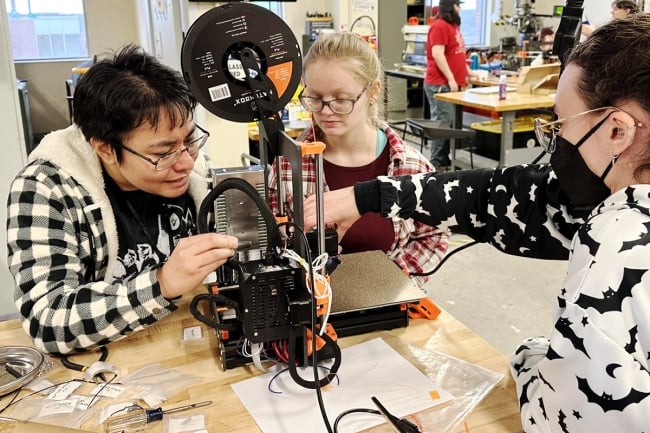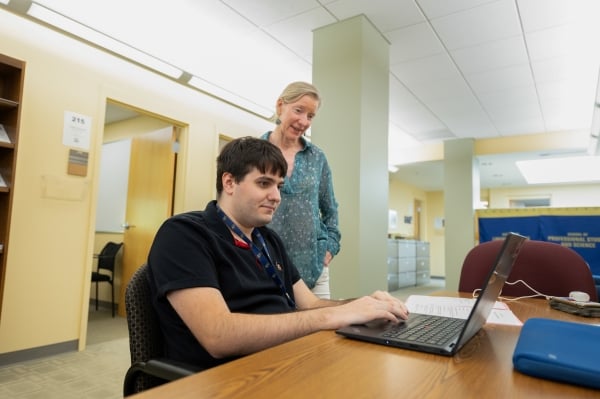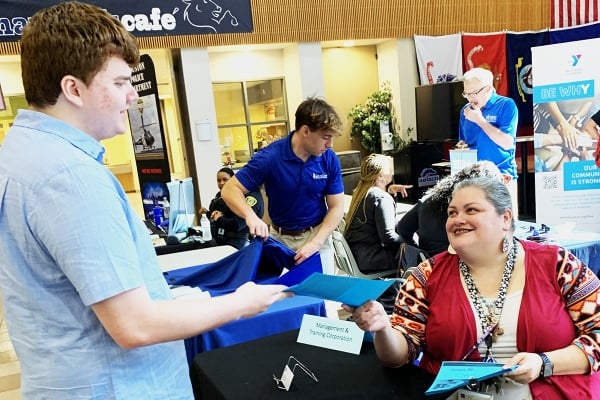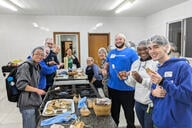You have /5 articles left.
Sign up for a free account or log in.

The Rochester Institute of Technology’s Career Ready Bootcamp helps neurodivergent students prepare to enter the workforce and experience successful outcomes.
Rochester Institute of Technology
Research by the University of Connecticut Center for Neurodiversity & Employment Innovation has found that an estimated 30 to 40 percent of America’s approximately 50 million neurodivergent adults are unemployed. Other studies have found the rate may be as high as 85 percent for people with autism.
Disability advocates and college administrators whose institutions are increasingly enrolling neurodivergent students say businesses may be overlooking these potential job candidates to fill their employment needs, especially at a time when the labor market is relatively tight.
A recent article from the MIT Sloan Management Review, a quarterly magazine from the university’s business school focused on the intersection of academia and business leadership and management, adds to the growing view that neurodivergent people are untapped employees and that community colleges can be the training pipelines that connect them to employers.
“Far too many neurodivergent people are falling through the cracks,” Maureen Dunne, CEO of a neurodiversity consulting organization and a neurodivergence researcher, wrote in the article. “The paucity of successful and authentic neurodiversity-inclusive pathways in higher education, our workplaces, and our communities has tangible implications and hampers the success of organizations everywhere.”
Dunne’s upcoming book, The Neurodiversity Edge, collects her over 20 years of research, case studies and interviews to provide a guide for embracing neurological differences. She’s also a former president of the Illinois Community College Trustees Association, which lobbied for the passage of a state resolution in June that urged colleges to adopt neurodiversity-inclusion statements, which she hopes will be a starting point for leaders to develop practices and policies that help neurodiverse students thrive.

Jan Coplan (right), senior director of employer relations at Landmark College, supports a neurodivergent student employed in her office as part of a work-readiness program.
Landmark College
“We’re at a point where there’s been enough progress in different programs and initiatives that with more collaboration, we can make significant progress, not just for graduation rates and student success, but employment outcomes,” Dunne added in an interview.
‘Primed’ for Pipelines
The term “neurodivergent” includes individuals with autism, dyslexia, ADHD, Tourette’s syndrome and other learning and mental health differences that would be considered atypical. A growing body of research shows that a large portion of college students with these neurological differences start at community colleges because they provide more accessibility and are smaller and often easier to navigate.
Brett Ranon Nachman, director of research for the College Autism Network, which connects people and resources to improve access, experiences and outcomes for postsecondary students with autism spectrum disorders, said that community colleges’ high population of neurodivergent students and understanding of the needs of local industries make them “primed” to develop neurodiversity pathway programs.
“Ultimately, community colleges are focused on propelling students in their respective areas of interest that often translate to careers,” said Nachman, who is autistic. “I see community colleges as really well situated to address labor shortages and also to be able to propel a number of nontraditional learners.”
The number of such programs is growing. According to a database maintained by the College Autism Network, there are roughly 115 autism-specific support programs in two- and four-year colleges across the country, some of which serve neurodivergent students more broadly. That’s up from 74 programs in 2021.
“Many of these programs are increasingly embedding employment-related material and curriculum,” Nachman said. “The piece that really has been missing until recently is thinking about, in what ways are we … propelling students to reach goals that extend beyond the boundaries of campus, and that is often employment.”
New and Old, Programs Are Growing
Lone Star College, a community college system in Houston, introduced its neurodivergence-support program, LifePATH, at two of its campuses that had particularly high populations of neurodivergent students, LSC-Tomball in 2015 and LSC-Montgomery in 2019. College administrators are now planning to expand some support services systemwide starting next spring by providing training for all employees on how to be neurodivergence allies.
“We recognize not every student who’s neurodivergent needs or wants to enroll in a specialty program,” said Montisha Hines-Goosby, the LifePATH director at the Montgomery campus. We want to make sure … staff have proper tools and strategies to be able to effectively work with the population.”

A neurodivergent student from Lone Star College’s LifePATH program talks to a potential employer at a collegewide career fair.
Lone Star College
Hines-Goosby said program leaders want to increase the number of employment pathways available to neurodivergent students.
The program is scheduled to host its first job fair focused on neurodiversity with at least 15 employers next spring. Hines-Goosby anticipates the fair will help Lone Star students as well as community members.
“Giving people the opportunity to interact and have that hands-on experience with our students is so very important, because it helps to establish rapport and dismantle the stereotypes,” she said.
Even the handful of long-existing programs are increasingly focused on career services.
Solvegi Shmulsky has worked at Landmark College for 28 years, previously as director of the Center for Neurodiversity and now as dean of the School of Liberal Studies and the Arts. She said the Vermont institution, which exclusively serves “students who learn differently,” has created “adaptive internships” designed to support neurodivergent students. Landmark has also partnered with major corporations and agencies such as Hasbro, Dell, the Environmental Protection Agency and Prudential.
“Employers will come here, and they’ll talk to a panel or talk to students, because they have a lot of interest in what they can do to make their workplaces more inclusive,” Shmulsky said. “In the early days, the career connections office didn’t have much of a profile … now, the staff is much more integrated.”
Jan Coplan, director of employer relations and career connections at Landmark, said the college has added bachelor’s degree programs and shifted the role of one office from helping students transfer to a four-year college to helping prepare them for employment.
“It’s been an overhaul of our whole philosophy. We’re putting a whole new emphasis on career readiness after graduation,” Coplan said.
The Rochester Institute of Technology, which launched its Spectrum Support Program in 2008 and Neurodiverse Hiring Initiative in 2018, has also grown its pathways for neurodivergent students. Kendra Evans, director of the programs, said RIT’s Career Ready Bootcamp, a three-week summer program, grew from eight participants in 2018 to 30 this year.
Prevalence Grows
Many higher ed experts attribute the increasing number and scale of neurodivergent programs to the growing awareness of neurodivergence as it becomes more prevalent in society. The CDC estimates that one in 36 children were diagnosed as autistic in 2020, up from one in 150 in 2000.
Anthony Pacilio, vice president of neurodiverse solutions at CAI, a tech services firm and leading collaborator with colleges and neurodiverse-friendly employers, said that ensuring funding keeps pace with the influx of neurodivergent students will be one of the biggest challenges for colleges with both new and pre-existing programs.
“There’s been such an increase in the amount of students who are neurodivergent, and I don’t know that we’ve caught up completely with the resources available,” said Pacilio, who was previously vice president of JPMorgan Chase’s Autism at Work program. “We always see a need for additional advisers and career counselors.”
Experts say such programs may also be gaining attention because they will be pivotal to helping employers build a “future-ready” workforce. Neurodivergence is often associated with innovation, nonlinear thinking, deductive reasoning, hyperfocus and multisensory pattern recognition. Having such skill sets historically led to stereotyping of neurodivergent people as being strictly qualified for tech jobs, but Pacilio said such impressions are changing.
“We have placed people in all sorts of verticals, from financial to legal to health care to hospitality,” he said.
Lee Burdette Williams, executive director of the College Autism Network, said the value of corporate investment is another reason for growth in pathway programs for neurodiverse students.
“When colleges and universities can find corporate partners who are interested in investing in a program, whether it’s financial investment or just being able to provide internships and jobs, that gets attention on a campus,” she said.
Dunne, author of the recent MIT Sloan Management Review article, said colleges looking to expand career pathways for the neurodivergent community should start by getting the support of institutional leaders.
“It’s getting leadership, including the president, cabinet and the trustees, on board with a simple value statement,” she said. “Having that buy-in has then led to a lot of deeper conversations about what could be done better or differently.”




